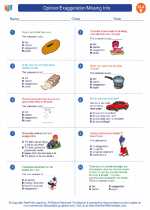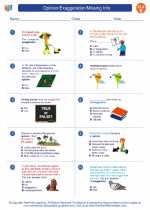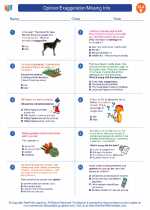Opinion, Exaggeration, and Missing Information in Writing
When writing or reading a text, it's important to be able to identify and understand the presence of opinions, exaggerations, and missing information. These elements can impact the overall message and credibility of a piece of writing.
Opinion
An opinion is a personal belief or judgment about something. When reading a text, it's important to be able to differentiate between factual information and the author's opinions. Look for words and phrases that indicate the author's viewpoint, such as "I believe," "In my opinion," or "It seems to me." It's important to consider different perspectives and be aware of the influence of opinions on the overall message of a text.
Exaggeration
Exaggeration involves overstating or overemphasizing a particular point or idea. Authors may use exaggeration to make a point more impactful or to persuade readers. Look for phrases or statements that seem extreme or unlikely. Consider the intended effect of the exaggeration and how it contributes to the overall tone and message of the text.
Missing Information
Missing information refers to the absence of crucial details or facts in a text. When reading, it's important to identify any gaps in information that may affect the reader's understanding or interpretation of the text. Consider what information might be missing and how its absence could impact the overall message. It's also important to critically evaluate the reliability and credibility of a text when crucial information is omitted.
Study Guide
Here are some practice questions and activities to help you understand and identify opinion, exaggeration, and missing information in writing:
- Read a short passage and identify any opinions expressed by the author. How do the opinions influence the overall message of the text?
- Find examples of exaggeration in a piece of writing. Consider the effect of the exaggeration on the reader and the author's intended message.
- Read a text and identify any missing information or crucial details that are not provided. Consider how the absence of this information impacts your understanding of the text.
- Write a short passage expressing your opinion on a topic of your choice. Be mindful of how your opinions are conveyed and consider how they might impact the reader.
- Discuss a piece of writing with a classmate or friend and identify any instances of opinion, exaggeration, or missing information. Compare your interpretations and consider how these elements affect the overall message of the text.
By practicing these skills, you'll become more adept at recognizing and understanding the presence of opinion, exaggeration, and missing information in writing.
[Opinion/Exaggeration/Missing Info] Related Worksheets and Study Guides:
.◂English Language Arts Worksheets and Study Guides Fifth Grade. Opinion/Exaggeration/Missing Info

 Worksheet/Answer key
Worksheet/Answer key
 Worksheet/Answer key
Worksheet/Answer key
